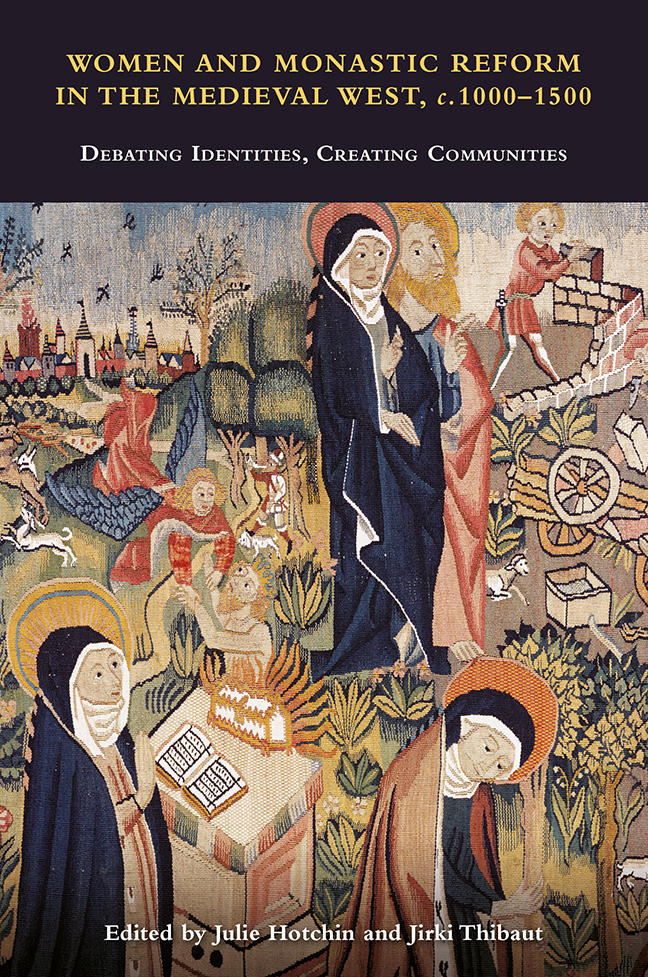 Women and Monastic Reform in the Medieval West, c.100-1500
Women and Monastic Reform in the Medieval West, c.100-1500 Book contents
- Frontmatter
- Dedication
- Contents
- List of Illustrations
- List of Contributors
- Acknowledgements
- List of Abbreviations
- 1 Debating Identities: Women and Monastic Reform in the Medieval West, c. 1000–1500
- 2 Liturgy and Female Monastic Hagiography Around the Year 1000: A lecture croisée of the Life of Liutrud, the Second Life of Glodesind of Metz and the So-called Pontificale Romano-Germanicum
- 3 Remakers of Reform: The Women Religious of Leominster and their Prayerbook
- 4 The Materiality of Female Religious Reform in Twelfth-Century Ireland: The Case of Co-located Religious Houses
- 5 Women as Witnesses: Picturing Gender and Spiritual Identity in a Twelfth-Century Embroidered Fragment from Northern Germany
- 6 Mulieres religiose and Cistercian Nuns in Northern Italy in the Thirteenth Century: A Choice of ‘Order’
- 7 Circulation of Books and Reform Ideas between Female Monasteries in Medieval Castile: From Twelfth-Century Cistercians to the Observant Reform
- 8 Women, Men and Local Monasticism in Late Medieval Bologna
- 9 Building Community: Material Concerns in the Fifteenth-Century Monastic Reform
- 10 Who Made Reform Visible? Male and Female Agency in Changing Visual Culture
- 11 Nuns, Cistercian Chant and Observant Reform in the Southern Low Countries
- Index
- Other volumes in Studies in the History of Medieval Religion
9 - Building Community: Material Concerns in the Fifteenth-Century Monastic Reform
Published online by Cambridge University Press: 09 January 2024
- Frontmatter
- Dedication
- Contents
- List of Illustrations
- List of Contributors
- Acknowledgements
- List of Abbreviations
- 1 Debating Identities: Women and Monastic Reform in the Medieval West, c. 1000–1500
- 2 Liturgy and Female Monastic Hagiography Around the Year 1000: A lecture croisée of the Life of Liutrud, the Second Life of Glodesind of Metz and the So-called Pontificale Romano-Germanicum
- 3 Remakers of Reform: The Women Religious of Leominster and their Prayerbook
- 4 The Materiality of Female Religious Reform in Twelfth-Century Ireland: The Case of Co-located Religious Houses
- 5 Women as Witnesses: Picturing Gender and Spiritual Identity in a Twelfth-Century Embroidered Fragment from Northern Germany
- 6 Mulieres religiose and Cistercian Nuns in Northern Italy in the Thirteenth Century: A Choice of ‘Order’
- 7 Circulation of Books and Reform Ideas between Female Monasteries in Medieval Castile: From Twelfth-Century Cistercians to the Observant Reform
- 8 Women, Men and Local Monasticism in Late Medieval Bologna
- 9 Building Community: Material Concerns in the Fifteenth-Century Monastic Reform
- 10 Who Made Reform Visible? Male and Female Agency in Changing Visual Culture
- 11 Nuns, Cistercian Chant and Observant Reform in the Southern Low Countries
- Index
- Other volumes in Studies in the History of Medieval Religion
Summary
While the long twelfth and the sixteenth centuries have most captivated scholars interested in monastic reform, the vivacity of monastic life in the fifteenth century has attracted a growing number of scholars who are uncovering a period vibrant with new forms of religious expression, including new religious movements and enthusiasm for religious reform., Much of this interest has focused on movements such as the Modern Devotion, the establishment of new orders, or the incorporation of holy women on the margins, such as the beguines. Studies of reform, like monastic scholarship in general, tend to focus on an order, house or region, which allows for detailed studies but obscures a broad view of commonalities in reform and monastic experience across institutions. Examining the variety of reforming efforts in a long fifteenth century as a Europe-wide phenomenon, as Kaspar Elm, Bert Roest and James Mixson have suggested, provides a more expansive framework for contextualising fifteenth-century reform efforts, ideals, practices and resistance. While reform was not a coherent movement, organised and implemented across Europe as part of a consistent, centrally driven programme, it was made up of similarly intended local conversations with shared goals, methods, purposes and contextually contingent impacts that deserve more systematic study. Even as James Mixson and Bert Roest have highlighted the significance of the Observant reform as a web connecting reformers and institutions in Germany, the Low Countries, Italy and Spain, the vibrant reforms wrapping themselves around monastic life in Western France still need weaving into this web. This is especially true since even the Observant reform of the Franciscans in France, which shared similar ideals with the larger movement, worked separately from it, with French Vicar Generals and Provincial Masters overseeing reforms there, and Colette of Corbie (1381–1447), the influential French Franciscan abbess, complicating reform by founding the Colettine Poor Clares in the early fifteenth century.
This chapter examines the impact of fifteenth-century monastic reform on spatial and architectural changes, focusing on the abbey of Sainte-Croix in Poitiers, a significant house in Western France. Sainte-Croix was influenced deeply by contemporary ideas about monastic reform, especially ideas about community and property growing out of the Observant movement, the Colettine reforms, and reform at Fontevraud, a significant monastery and head of its own order that underwent reform in the second half of the fifteenth century.
- Type
- Chapter
- Information
- Women and Monastic Reform in the Medieval West, c.100-1500Debating Identities, Creating Communities, pp. 202 - 226Publisher: Boydell & BrewerPrint publication year: 2023


